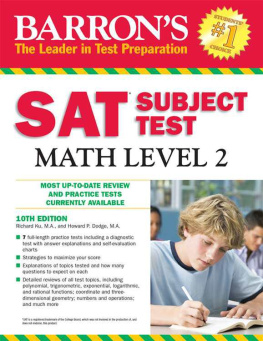BARRONS  SAT * SUBJECT TEST MATH LEVEL 1
SAT * SUBJECT TEST MATH LEVEL 1
4TH EDITION
Ira K. Wolf, Ph.D.
President, PowerPrep, Inc.
Former High School Math Teacher,
College Professor of Mathematics, and
University Director of Teacher Preparation
 * SAT is a registered trademark of the College Board, which was not involved in the production of, and does not endorse, this product.
* SAT is a registered trademark of the College Board, which was not involved in the production of, and does not endorse, this product.  About the Author Dr. Ira Wolf has had a long career in math education. In addition to teaching math at the high school level for several years, he was a professor of mathematics at Brooklyn College and the Director of the Mathematics Teacher Preparation program at SUNY Stony Brook.
About the Author Dr. Ira Wolf has had a long career in math education. In addition to teaching math at the high school level for several years, he was a professor of mathematics at Brooklyn College and the Director of the Mathematics Teacher Preparation program at SUNY Stony Brook.
Dr. Wolf has been helping students prepare for the PSAT, SAT, and SAT Subject Tests in Math for 35 years.
He is the founder and president of PowerPrep, a test preparation company on Long Island that currently works with more than 1,000 high school students each year. Copyright 2012, 2010, 2008 by Barrons Educational Series, Inc. Previous edition Copyright 2005 under the title How to Prepare for the SAT II: Math Level 1C. All rights reserved. No part of this work may be reproduced or distributed in any form or by any means without the written permission of the copyright owner. *Please Note: This e-Book may appear differently depending on which device you are using. *Please Note: This e-Book may appear differently depending on which device you are using.
Please adjust accordingly. Since you are reading this book, it is likely that you have already decided to take the SAT Subject Test in Math Level 1; at the very least, you are seriously considering taking it. Therefore, you probably know something about the College Board and the tests it administers to high school students: PSAT, SAT, and SAT Subject Tests. In this short introductory chapter, you will learn the basic facts you need to know about the Subject Tests. In the next chapter, you will learn everything you need to know about the Math Level 1 test in particular. In 2009, the College Board instituted a Score Choice policy for all SAT Subject Tests, as well as for the SAT.
What this means is that at any point in your high school career you can take (or even retake) any Subject Tests you want, receive your scores, and then choose whether or not the colleges to which you eventually apply will ever see those scores. In fact, you dont have to make that choice until your senior year when you are actually sending in your college applications. Suppose, for example, that you take the Biology test one year and the Chemistry test the following year. If you earn very good scores on both exams, then, of course, you can send the colleges both scores; if, however, your Chemistry score is much better than your Biology score, you can send the colleges only your Chemistry score and the colleges wont even know that you took the Biology test. Similarly, if you take the Math Level 1 test in June and retake it in November, you can send the colleges just your higher score and they will never know that you took it twice. WHAT ARE SAT SUBJECT TESTS? Each SAT Subject Test is an hour-long exam designed to test your knowledge of one specific course that you studied in high school.
The following chart lists all the SAT Subject Tests that the College Board offers.
| Subject | Tests |
| English | Literature |
| Social Studies | World History |
| United States History |
| Mathematics | Math Level 1 |
| Math Level 2 |
| Science | Biology |
| Chemistry |
| Physics |
| Foreign Language | French |
| German |
| Hebrew |
| Italian |
| Latin |
| Spanish |
| Chinese |
| Japanese |
| Korean |
Each of these tests consists entirely of multiple-choice questions. The number of questions ranges from 50 on the Math 1 and Math 2 tests to 95 on World History.
Why Should You Take SAT Subject Tests? Not every college and university requires you to submit SAT Subject Test scores as part of the admissions process. So if you knew with certainty that you were applying only to schools that do not require their applicants to take Subject Tests, you would not have to take any. However, when you are in ninth-, tenth-, or even eleventh-grade, it is impossible for you to know exactly which schools you will be applying to in the fall of your senior year.
Also colleges and universities that dont currently insist that applicants submit scores from SAT Subject Tests may change their policy. In the past few years, many colleges that previously had not required applicants to take Subject Tests have begun requiring them. Therefore, most studentsand certainly all good students should plan on taking some Subject Tests. Another reason for taking SAT Subject Tests is that even colleges that do not require them for admissions may use them for placement purposes. Often, if you have a good score on a Subject Test, you may be exempted from taking an introductory course in that area and be able to take a more interesting elective. Finally, remember that because of Score Choice, you are at no risk.
If you take a Subject Test and dont get a score you are happy with, you never have to submit it. How Many SAT Subject Tests Should You Take? No college requires applicants to submit scores from more than three SAT Subject Tests, but many schoolsincluding almost all of the most competitive onesdo ask for two or three. Consequently, most students should plan to take at least two Subject Tests and very strong students should take at least three. You should know, however, that many students take more than three, some as many as six or seven. They do this because the Score Choice policy allows them to send whichever scores they like. So they can pick their best two or three scores from among all the tests they have taken.
Or, if they have really good scores on more than three tests, they can try to really impress the admissions officers by submitting scores from four, or five, or even more tests. A good guideline is that you should take an SAT Subject Test in any subject in which you feel you can earn a high score. On any test date, you may take one, two, or three Subject Tests, but you may not take any in the month you take the SAT. When Should You Take SAT Subject Tests? Most SAT Subject Tests are given six times per year: in January, May, June, October, November, and December. By far the most common month in which to take a Subject Test is June, at the end of the year in which you study the subject on that test. For example, you certainly should not take a history or science Subject Test in December or January of the year you are taking the courseat that point you will have covered less than half the years work.
Also, taking one of those tests in the fall after your course is over makes no sense when you have not looked at the subject for several months. The exceptions to this general rule are the Math Level 1 test, which you can take any time after you have completed three years of high school math, and the foreign language exams, which you should put off until you have completed as many years of study as possible. HOW ARE SAT SUBJECT TESTS SCORED? Two types of scores are associated with SAT Subject Tests: raw scores and scaled scores. Your raw score, which you do not receive, is calculated by giving you 1 point for a correct answer and deducting 
Next page




 SAT * SUBJECT TEST MATH LEVEL 1
SAT * SUBJECT TEST MATH LEVEL 1 * SAT is a registered trademark of the College Board, which was not involved in the production of, and does not endorse, this product.
* SAT is a registered trademark of the College Board, which was not involved in the production of, and does not endorse, this product.  About the Author Dr. Ira Wolf has had a long career in math education. In addition to teaching math at the high school level for several years, he was a professor of mathematics at Brooklyn College and the Director of the Mathematics Teacher Preparation program at SUNY Stony Brook.
About the Author Dr. Ira Wolf has had a long career in math education. In addition to teaching math at the high school level for several years, he was a professor of mathematics at Brooklyn College and the Director of the Mathematics Teacher Preparation program at SUNY Stony Brook.